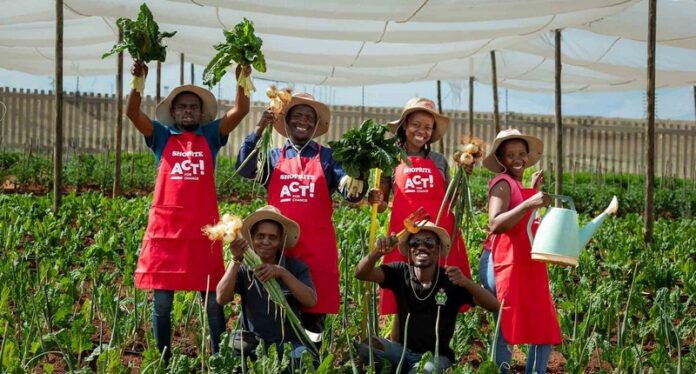
Across South Africa, small pockets of green are rewriting the story of hunger and community, one harvest at a time. From bustling rooftops in the city to church plots in townships and schoolyards in rural villages, neighbours are planting more than just vegetables – they are sowing resilience, skills, and a sense of belonging.
Now, a new initiative is shining a national spotlight on these grassroots heroes. Shoprite has launched the Act For Change Food Garden Competition, with R1 million in tailored support up for grabs for community gardens making a real impact.
Growing Communities, Not Just Crops
Over the past decade, Shoprite has supported nearly 300 community gardens, producing over 106 000 kg of fresh produce in just the past year. But these gardens offer more than affordable food – they provide a place for people to learn agricultural skills, share knowledge, and even earn an income from surplus sales.
“By investing in community food gardens, Shoprite is not only increasing access to nutritious produce but also equipping communities with skills and opportunities,” says Sanjeev Raghubir, Chief Sustainability Officer at the Shoprite Group.
The competition is designed to strengthen these gardens further, with prizes including essentials like fencing, irrigation systems, shade netting, and member training. The first-place winner will receive support to the value of R225 000, second place R200 000, and third place R170 000. The fourth, fifth, and sixth prize winners will each receive R150 000, R130 000, and R120 000 respectively.
Why Food Gardens Matter More Than Ever
The recently published South African Food Security Index 2025 showed improvement, rising from 44.9 in 2023 to 56.5 in 2025. Yet millions of households still face challenges in putting nutritious meals on the table.
Community food gardens are a powerful response to this challenge. They bring fresh produce closer to home while also building shared responsibility and social connections. They don’t just feed people, they uplift them – offering dignity, purpose, and hope in the face of food insecurity. In the Western Cape, these gardens also reflect a province in motion, where innovation and community spirit work together to create healthier, more resilient neighbourhoods.
Stories of Growth and Belonging
One shining example is the Neighbourhood Old Age Homes (NOAH) garden in Khayelitsha, Cape Town. For elderly residents, this garden is both a source of spinach, carrots, and herbs, and a cherished social space.
“Gardening brings so many benefits – it’s not only about food, it’s about friendship and belonging,” says Anne Dobson, Head of Sustainability at NOAH.
Supported by Shoprite’s Act For Change programme since 2019, the NOAH garden has received fencing, shade netting, and permaculture training. For residents, the rewards are measured not only in harvest baskets but also in companionship and joy.
How to Get Involved
The Act For Change Food Garden Competition is open to all community gardens across South Africa, whether they are independently run or supported by local organisations.
To enter, participants must be 18 years or older, represent a community-based food garden (not private home gardens or companies), provide a short description of the garden’s history, purpose, and community impact, and upload photos of the garden.
Entries close on 30 November 2025, with winners announced by 30 April 2026.
Planting Seeds for a Better Future
At its heart, this competition is about recognising the resilience and creativity of ordinary South Africans who are transforming bare soil into thriving gardens. Each patch of green is a reminder that food gardens are not just about crops – they are about people, friendship, and the belief that change truly grows from the ground up.
Like airports, hotels, and new travel routes, these gardens show that progress in the Western Cape is not only about infrastructure, but also about communities moving forward together.
To enter: Harvesting change: Shoprite’s R1-million food garden competition launches | Shoprite Holdings

